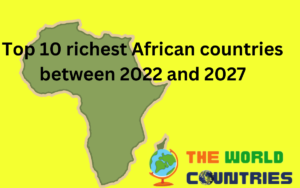Top 10 African Countries with the Best Movie Industries

Africa is home to a thriving film industry that has gained recognition and acclaim both locally and internationally. The continent is producing high-quality movies that entertain, educate, and inspire audiences around the world. In this article, we will explore the top 10 African countries with the best movie industries, showcasing the talent and creativity that has emerged from these nations.
The movie industry in Africa
The movie industry in Africa is a force to be reckoned with, and I couldn’t be more excited about it! Over the past decade, African cinema has experienced tremendous growth and has gained international recognition. From Nigeria’s booming Nollywood to South Africa’s vibrant film scene, African filmmakers are telling captivating stories that resonate with audiences around the world.
One of the reasons why I am so enthusiastic about the African movie industry is its ability to showcase the diverse cultures and rich heritage of the continent. Each African country has its own unique stories to tell, and through film, these stories are brought to life. Whether it’s a heartwarming tale set in a rural village or a gripping urban drama, African filmmakers are shedding light on the different facets of African society and challenging stereotypes.
Another aspect that excites me about the African movie industry is the rise of talented actors and actresses who are making a name for themselves on the global stage. These individuals are not only incredibly talented but also serve as role models for aspiring actors across the continent. They are proving that African talent is just as capable and deserving of recognition as their Hollywood counterparts.
Furthermore, I am thrilled by the increasing recognition and support that African films are receiving at international film festivals. Films from Africa are now being featured at prestigious events such as the Cannes Film Festival and the Toronto International Film Festival, providing a platform for African filmmakers to showcase their work to a global audience. This exposure not only helps in promoting African cinema but also opens doors for collaboration and co-productions with filmmakers from other parts of the world.
It is also exciting to see how technology has played a significant role in the growth of the African movie industry. With the rise of streaming platforms and digital distribution channels, African films are now more accessible than ever before. This means that audiences from all over the world can enjoy and appreciate the creativity and talent coming out of Africa.
Lastly, I am thrilled by the impact that the African movie industry has on local economies. Filmmaking provides job opportunities for actors, crew members, and support staff, contributing to economic development in African countries. Additionally, tourism often increases as people become interested in visiting the locations featured in popular films. This creates a positive cycle of growth and development for both the film industry and the local communities.
based on all these, one can boldly say the movie industry in Africa is thriving, and I couldn’t be more excited about it! From showcasing diverse cultures to promoting talented actors, from international recognition to technological advancements, African cinema is making its mark on the global stage. It is an industry that is not only entertaining but also empowering, providing opportunities for growth and development. I am eagerly looking forward to seeing what the future holds for the African movie industry and the incredible stories it has yet to tell.
The Top 10 African Countries with the Best Movie Industries
1. Nigeria – The Powerhouse of African Cinema
Nigeria, often referred to as Nollywood, is undeniably the biggest movie industry in Africa and one of the largest in the world. With a rich storytelling tradition and a constant stream of movies, Nollywood has captivated audiences since its inception. Directors and filmmakers like Tunde Kelani, Kemi Adetiba, and Kunle Afolayan have pushed the boundaries of Nigerian cinema and paved the way for a new generation of filmmakers. Recent releases such as “King of Boys,” “Oloture,” and “Juju Stories” have garnered international acclaim and bridged the gap between Nigeria’s major tribes.
2. South Africa – Cinematic Prowess and Technological Innovation
South Africa has established itself as a major player in the African movie industry, producing breathtaking films that uniquely tell the African story. The country’s innovative use of technology and cinematic techniques has set it apart from other African nations. Films like “Queen Sono,” “King of Jo’burg,” and “Amandla” showcase the country’s commitment to artistic excellence and storytelling. South Africa’s film industry continually seeks advancement, making it a force to be reckoned with on the continent.
3. Kenya – A Rising Star in African Cinema
The film industry in Kenya may be relatively small compared to some African counterparts, but it has steadily grown over the years. Kenya’s first groundbreaking film, “Men Against the Sun,” was released in 1952, marking the beginning of Kenyan cinema. Since then, the industry has evolved, tackling social issues and producing films that resonate with both local and international audiences. Wanuri Kahiu’s “Rafiki,” a moving drama about two young women in love, gained global recognition and challenged stereotypes about Africa. Despite facing setbacks, Kenyan filmmakers continue to push boundaries and tell captivating stories.
4. Uganda – The Fastest Growing Film Industry
Uganda’s film industry, known as Ugawood or Kinauganda, is considered one of the fastest-growing in Africa. With a passion for telling compelling African stories, Uganda has seen significant growth in its film production. The industry has its unique characteristics, with viewers going to video halls to watch movies accompanied by narrators called Video Jokers. Films like “Who Killed Captain Alex?” have garnered international attention and are regarded as important contributions to African cinema. Queen of Katwe, The Girl in the Yellow Jumper, and Bed Of Thorns are just a few examples of the exciting films coming out of Uganda.
5. Cameroon – Upward Trajectory in Film Production
The Cameroonian film industry, sometimes known as Collywood, has experienced tremendous growth in recent years. Films produced locally have evolved in production value and have found their way onto digital platforms like Amazon and Netflix. The industry’s upward trajectory is evident in projects such as “The Fisherman’s Diary,” which was submitted as the country’s official entry to the Oscars in 2021. Featuring films that predominantly focus on drama, Cameroon is making a name for itself with its unique style of storytelling.
6. Ghana – A Legacy of Beautiful and Successful Films
Ghana’s film industry, known as Ghollywood, has faced various challenges in recent years but has managed to produce beautiful and successful films. Despite setbacks, movies like “Picture Perfect,” “Azali,” and “Single, Married, and Complicated” have showcased the talent and creativity of Ghanaian filmmakers. The industry continues to evolve, and with the collaboration between Nollywood and Ghollywood, audiences can expect more exciting and engaging content in the future.
7. Tanzania – Swahiliwood’s Emergence
Tanzania’s film industry, often called Swahiliwood, emerged around 2001. Initially producing films with low budgets and short schedules, the industry has grown to include higher-quality productions. Films like Binti, a compelling drama exploring womanhood in Tanzania, have gained recognition, and international streaming platforms like Netflix have taken notice. Tanzanian filmmakers are telling unique stories that resonate with audiences both locally and globally.
8. Egypt – A Rich History of Egyptian Cinema
Egyptian cinema has a rich history that has evolved. Internationally, smaller art films have gained attention, while domestically, filmmakers have faced challenges in retaining an audience. However, some filmmakers have managed to bridge the gap, delivering films of high artistic quality with mass appeal. Films like “Sahar el Layali” and “Imarat Yacoubian” have achieved both critical acclaim and box office success, signifying a changing landscape in Egyptian cinema.
9. Mozambique – A Rebirth of the Film Industry
Mozambique’s film industry experienced setbacks in the past but has now undergone a rebirth. Mozambican filmmakers are making their mark with a renewed focus on producing quality films. Films like “Redemption” and “Terra Sonâmbula” have garnered international recognition and awards, showcasing the country’s talent and unique storytelling abilities. Mozambique is an exciting destination for African cinema, with filmmakers pushing boundaries and creating compelling narratives.
10. Namibia – Making Strides in African Cinema
Namibia, though a relatively small country, has made significant contributions to the African film industry. Local filmmakers have been steadily producing quality films that contribute to the country’s economy. Namibian films like “The White Line,” which was submitted for consideration at the Oscars, demonstrate the country’s commitment to storytelling and artistic excellence. Namibia’s film industry may be small, but it is making strides and adding to the diverse landscape of African cinema.
Conclusion
Africa’s film industry is a vibrant and growing sector, with each country contributing its unique stories, talent, and creativity. Nigeria’s Nollywood remains the powerhouse of African cinema, while South Africa, Kenya, Uganda, Cameroon, Ghana, Tanzania, Egypt, Mozambique, and Namibia are also making significant strides in the industry. These countries have produced films that have captivated audiences worldwide, highlighting the wealth of talent and creativity present in African cinema. As the African film industry continues to evolve and expand, audiences can expect even more exciting and culturally rich content from the continent.





